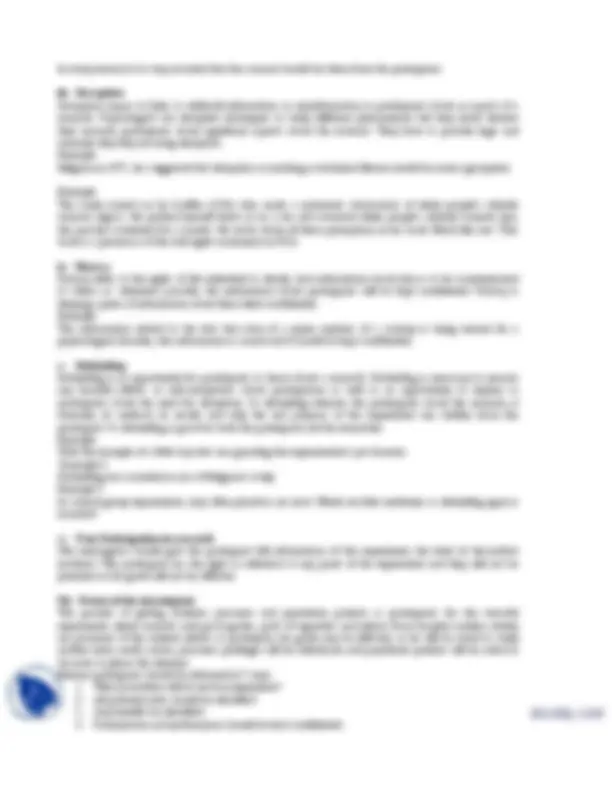





Study with the several resources on Docsity

Earn points by helping other students or get them with a premium plan


Prepare for your exams
Study with the several resources on Docsity

Earn points to download
Earn points by helping other students or get them with a premium plan
Community
Ask the community for help and clear up your study doubts
Discover the best universities in your country according to Docsity users
Free resources
Download our free guides on studying techniques, anxiety management strategies, and thesis advice from Docsity tutors
This course points out abnormal behavior reasons and its forms. Mostly it talks about amnestic disorder, mood disorder, developmental disorder, genetics, personality disorder, problems in childhood, psychological model, stress, substance disorder. This lecture includes: Participants, Deception, Investigator, Psychological, Association, Consent, Deception, Privacy, Debriefing, Plagiarism
Typology: Exercises
1 / 5

This page cannot be seen from the preview
Don't miss anything!




It refers to norms, standard, methods of conducting research. Why we should observe these ethics? Let us go through some research examples
1-Watson and Rayner in 1920 In this study an 11 month old boy, Albert was introduced to white rat and he was reported to show no fear. Just as he reached out to touch the rat a loud noise was created which startled little Albert and on repeated trials, Albert learned to fear white furry objects.
2-Latane and Darley (1976) In this study a child was asked to guard the experimenter’s pet hamster, which was then removed secretly from the cage through a hole in the floor when the boy was not looking. This was a source of mental stress for the boy.
3-Researchers and clinicians frequently use experimental and control groups in experiments where the experimental group gets the treatment while the control group gets placebo (sugar coated pills). This placebo looks like treatment but actually it is deception.
4-After World War – II , the Nazis forced the prisoners of war to go through some painful and uncomfortable “medical experiments.”
5-Milgram’s Experiment on Obedience and Conformity The debate on ethical principles in psychological research began with the classic experiment by Milgram in which volunteers were introduced to a participant; this participant was actually an experimental confederate. The volunteers became the teacher and they were asked to administer electric shocks to the participant for each mistake he made. The electric shocks ranged from 15 volts to 450 volts which was labeled as danger: severe shock”. A tape recording of screams and refusals of the confederate also deceived the volunteers. The volunteers were pressurized to continue the experiment. The volunteer continued to administer the electric shocks up to 450 volts.
This study opened the debate that the normal people are capable of behaving like a sadistic and cruel or evil individual.
To control these unethical practices in research the British Psychological Society (BPS) and the American Psychological Association (APA) provides Ethical Principles for Conducting Research with Human Participants (1992). The principles guide researcher the areas like risk, consent, deception, debriefing, and withdrawal from investigation, confidentiality, protection of participants, observational research, giving of advice to participants, and monitoring of colleagues in profession.
Scientists and researchers raise many ethical questions related to a research project. Ethical issues are concerned with federal and state laws as well. The American Psychological Association (APA) has formulated an ethics code regarding conduction of research, therapy, teaching and serving as administrators.
Following ethical standards are spelled out before researchers begin a psychological research.
Approval for the research project 1-Psychologists plan and conduct a research according to federal and state law and regulations as well as abiding by professional standards, governing the conduct of research related to human participants and animal subjects.
2-Psychologists get permission and approval from institutions and organizations, they are part of and they are conducting research for. So, they seek permission from their institutional research boards and other higher research boards governing them.
3-Psychologists design to conduct research in a scientific manner so that ethical acceptability under the ethics code is provided through institutional review boards, animal care and use societies or committees, peer consultations and other proper mechanisms. Psychologists take appropriate protections for the rights and welfare of human participants and other persons affected by research.
Nearly every college and university has an independent committee or a board which reviews every research project involving humans or animals as subjects, spells out the expenditure on the research and the benefit it will provide to the society. Thus every individual, who wants to do research, should inquire from the proper authority, about the appropriate procedure for institutional review.
Following ethical issues are important when we use humans as subjects.
i. Risk Risk is involved related with physical, psychological or social injury that may be caused to subjects. So a risk- benefit ratio should be purposed for each research project which is just like calculating a profit –loss index of the research project. Whether research participants are at risk or not, is an important question. Life is a risky affair. When we go to school, cross a street, all activities have an element of risk. To say that human participants in psychological research are at risk of physical, psychological and social risk of hurting themselves. So then it means that assessing risk benefit ratio is important. Risk is physical harm or possibility of physical injury. The researcher should protect participants from physical injury, bodily harm, emotional and mental stress arising out of deception as well. Minimal risk means that the possibility and magnitude of harm or discomfort in the research are not great or not more than the one encountered in the daily life during the performance of routine physical or psychological tests. Example – 1: The example discuss in the beginning of eleven months old Albert. Example – 2: Milgram’s Study on obedience
ii. Consent Researchers seek the willingness or consent of their students, patient, clients and other members of the community who are taking part in a scientific investigation. So informed consent of participants is either taken verbally or in writing in form of a contract that clearly spells out each and every detail of the investigation. In other words lying, cheating or fraudulent behavior on part of participant is violation of the consent contract. Inform consent means, that psychologist has informed the participant about the nature of the research, the methodology of the research, the consequences or results of declining to participate or to withdraw from the research at any stage. Example:
Plagiarism Psychologists do not present portions or elements of another persons work or data as their own, even if the other person’s work or data source is missing so it means that the publication credit be given to the real author. Don’t present portion or elements of another person’s work as your own or avoid giving the impression that another person’s work is yours. Ignorance is not a legitimate excuse. If you do not know that it’s a crime even then there is not excuse for it. Research on animal subjects is justified by the need to gain knowledge without putting humans to jeapody.
These rabbits are part of a drug-testing study. Their bodies are enclosed in the metal cases to prevent movement during the test. What steps might the researchers be using to treat the animals ethically?
Care and use of animals as subjects in research
Let us learn about Ethics of doing research in abnormal psychology.
1-The clinician’s decision to delay treatment, the people who need it is frequently questioned. Treatment is also with held when placebo control group are used in group experimental design.
2-Another important question relates to inform consent. Participants are told that they may or they may not receive a treatment. True inform consent is rare, in other words, only volunteers who are willing to participate in a study, their inform consent is seek. The concept of informed consent is derived from World War II where prisoners of war were forced into medical experiments.
3- APA wants that adults and children both should be protected from physical and psychological harm. Informed consent of children of age 7 and older is taken from their caregivers.
The society for research in child development 1990 has endorsed guidelines for research with children be provided to their caregivers and guardians. The APA ethical principles for conducting research is an extremely comprehensive document towards overall guidance towards respect for people’s rights and dignity, concern for others welfare and social responsibility. The new millennium looks forward to researchers to give up their unprofessional and unethical attitude towards research.